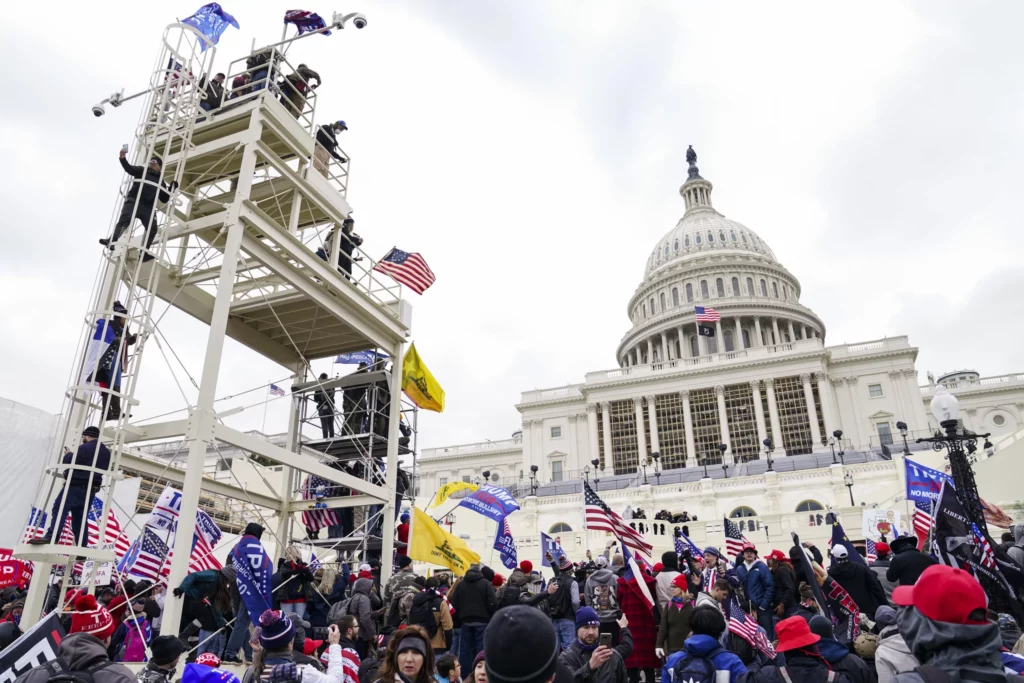
President-elect Donald Trump is facing expectations from defendants involved in the Jan. 6 Capitol riot that he will turn his promises to pardon them into reality when he returns to the White House in January.
Some defendants have signaled in court that they anticipate receiving pardons, while others have expressed eagerness to their lawyers, though it is unlikely that every defendant will receive Trump’s clemency.
WHAT HAPPENS NOW THAT TRUMP IS PRESIDENT-ELECT
More than 1,500 have been charged with federal crimes in connection to the Capitol breach during the past nearly four years, and a majority of them have pleaded guilty or been convicted by juries.
Trump has frequently described the defendants as “hostages,” honored them with song at his rallies, and deemed them victims of political persecution.

The president-elect vowed many times to pardon them on the campaign trail, but he often hedged his comments, alluding to the fact that some were violent offenders.
“I can’t say for every single one because a couple of them, probably they got out of control,” Trump said at a town hall last year, adding that he would pardon “a large portion of them.”
At a rally in Wisconsin in September, he said he will issue pardons to them on the first day he takes office.
“The moment we win, we will rapidly review the cases of every political prisoner unjustly victimized by the [Kamala] Harris regime, and I will sign their pardons on Day One,” Trump said. “We will completely overhaul Kamala’s corrupt Department of Injustice.”
A president has unilateral clemency authority under the Constitution, and Trump could exercise that authority in office to pardon the defendants, which would erase their charges. Or, he could commute the sentences of those still serving them, which would reduce or end their jail time but keep their charges intact.
He could also direct his Department of Justice to terminate legal proceedings for those who have not yet been convicted.
William Shipley, an attorney who has represented dozens of the defendants, said that even those who have had their cases fully adjudicated and are out of prison could benefit from a Trump pardon.
“It’s principally restoration of your civil rights, your right to vote, your Second Amendment rights, and any other rights that you might have lost by virtue of the felony,” Shipley told the Washington Examiner.
Who participated in the riot?
Prosecutors have said that nearly 600 of the defendants either assaulted police officers or obstructed law enforcement, and that a third of those used a deadly weapon or caused serious bodily injury to an officer.
Those who received periods of incarceration as punishment have seen sentences range from a few days to a few months to several years, depending on the charges involved.
Some defendants crossed into restricted areas of the Capitol grounds but left the vicinity quickly without laying a hand on anyone or any property. Others were violent and destructive.
One woman, a 53-year-old hairdresser, walked into the hallway of the Capitol, stayed for 10 minutes, and then left. She later posted on social media that she was “proud” to have been “part of it,” according to prosecutors. She pleaded guilty to one of the most common misdemeanors brought against defendants: parading, demonstrating, or picketing in the Capitol. A judge sentenced her to 14 days in prison.
In a more serious case, a gym owner named Scott Fairland wielded a police baton, scaled scaffolding, urged the crowd around him to “disarm” police and “storm” the Capitol, and was captured on video shoving an officer to the ground and punching his shield. He was sentenced to 3 1/2 years in prison.
A handful of Trump’s supporters who were members of radical groups, such as the Proud Boys or Oath Keepers, received anywhere from about 10 to 20 years in jail after they were found guilty of rare seditious conspiracy violations.
Who is asking for a pardon?
The Washington Examiner asked Shipley if he has heard from any of his clients about their interest in receiving pardons.
“The better question would be, who haven’t I heard from?” Shipley replied.
The lawyer added that he has advised all of his clients to have a “little bit of patience” while the process plays out.
But some defendants have not been able to wait. Brandon Heffner asked a judge this week to pause his court proceedings, indicating that he expected to be pardoned if he is convicted at his trial, which begins on Dec. 9.
“The granting of pardons of convicted J6 defendants placed into question the current J6 prosecutions,” Heffner’s attorney argued.
Heffner was arrested last year and released on his own recognizance. He is facing five nonviolent offenses, including disorderly conduct on U.S. Capitol grounds.
Authorities said in court papers that Heffner, who was dressed in tactical gear, was part of a group of rioters who held closed a door to the U.S. Capitol to block police officers from exiting. Heffner’s jury trial is set to begin Dec. 9, and if he is convicted, he could face months in jail.
DOJ prosecutors objected to Heffner’s motion, saying it was based on “speculation and conjecture” and should be denied.
Similarly, Christopher Carnell’s attorneys asked the court to pause his proceedings after Carnell was convicted of nonviolent offenses, including obstructing an official proceeding and several misdemeanors. Carnell breached restricted areas of the Capitol and mingled with rioters who were rummaging through Sen. Ted Cruz‘s papers in the Senate Chamber, authorities said. His attorneys are still fighting his conviction and have now asked to postpone a hearing set for Nov. 8 in anticipation of a pardon.
“Mr. Carnell, who was an 18-year-old nonviolent entrant into the Capitol on Jan. 6, is expecting to be relieved of the criminal prosecution that he is currently facing when the new administration takes office,” his attorneys wrote.
Judge Beryl Howell, an Obama appointee, swiftly denied the request.
“The potential future exercise of discretionary pardon power, an Executive Branch authority, is irrelevant to the Court’s obligation to carry out the legal responsibilities of the Judicial Branch,” Howell wrote.
CLICK HERE TO READ MORE FROM THE WASHINGTON EXAMINER
Enrique Tarrio, a former Proud Boys chairman who received the longest sentence of any defendant at 22 years, celebrated Trump’s win in a statement through his attorney and suggested that he could seek a pardon.
“We look forward to what the future holds, both in terms of the judicial process for our client and the broader political landscape under the new administration,” the lawyer wrote.



